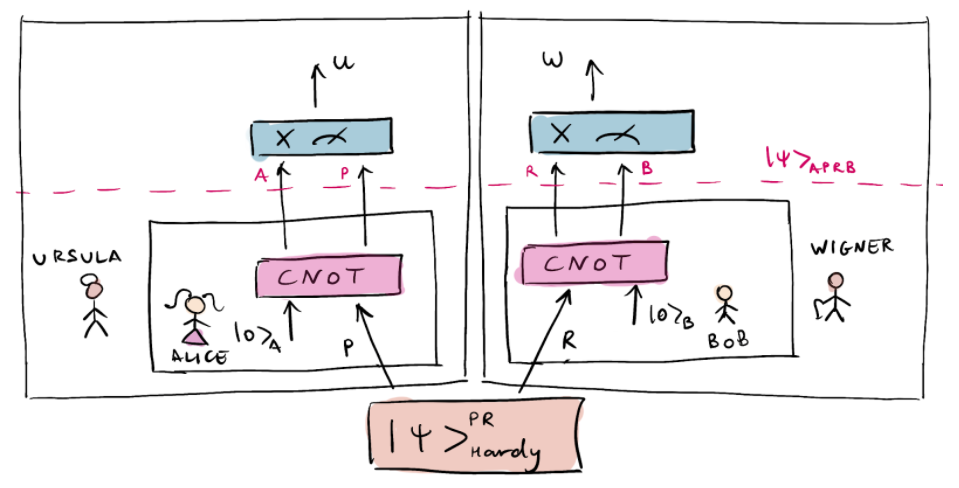Quantum Foundations
We study fundamental questions arising in physical theories of nature in general, and quantum mechanics in particular.

Our efforts in this area can be divided into two distinct yet interconnected goals: first, to understand how a theory can be constructed from basic principles and notions, and second, to provide a way and a method for how these theories should be probed.
Insight through paradoxes
There are many ways in which we can approach these questions. For instance, one can use logical paradoxes as a testing ground for theories, and identify what the inconsistencies entail for the theory in general. In science, what we usually understand under the notion of paradox is a thought experiment, carried out in the setting of a specific theory. Usually, the resolution of issues arising in thought experiments can lead to a major improvement in understanding a physical theory. For example, the resolution of Maxwell’s demon paradox in thermodynamics is shown through the application of Landauer’s principle, which implies a physical cost for information erasure, and is one of the most compelling applications of information science to physics.
A class of thought experiments that is especially insightful involves agents who themselves use the theory being tested in the experiment. A modern example of such a thought experiment is the one introduced by Daniela Frauchiger and Renato Renner [1]. We study the implications that the results of this thought experiment have on the logic that agents use for different theories: for example, for agents reasoning about the quantum theory within the framework of modal logic [2] or agents in generalized probabilistic theories [3].
References
- Daniela Frauchiger and Renato Renner. Quantum theory cannot consistently describe the use of itself. Nat. Commun. 9, 3711 (2018). external page doi: 10.1038/s41467-018-05739-8
- Nurgalieva Nuriya and Lidia del Rio. Inadequacy of modal logic in quantum settings. EPTCS 287, 267 (2019). external page doi: 10.4204/EPTCS.287.16
- V. Vilasini, Nuriya Nurgalieva and Lídia del Rio. Multi-agent paradoxes beyond quantum theory. New J. Phys. 21, 113028 (2019). external page doi: 10.1088/1367-2630/ab4fc4
Constructing theories
We also consider the way we construct theories and look for a minimal set of notions we have to use in order to describe a setting. One approach to this is the construction of a neural network architecture [1] that models the physical reasoning process and that can be used to extract simple physical concepts from experimental data without being provided with additional prior knowledge. The network finds the physically relevant parameters, exploits conservation laws to make predictions, and can be used to gain conceptual insights — for example, if there are alternative elegant formalisms that could solve some of the fundamental conceptual problems in modern physics. Another direction is to take a look at the reference-frame formalism in a multi-agent setting, where agents are trying to reconcile their descriptions of systems; this can pose a problem, for instance, in the case where they consider different factorizations of the Hilbert space they have access to.
A further line of investigation is understanding what processes within quantum mechanics do have a classical description [2]. This is important from a foundational point of view, as it leads to an understanding of what makes quantum mechanics special. But it is also important from a practical viewpoint, as it could tell us when a particular device or task can be performed equally well with a simpler classical device, rather than a quantum device that is harder to engineer.
Further considerations include investigating a more operational approach, such as resource theories of knowledge [3], which has proven a powerful tool to study how agents who are subject to certain constraints can act on physical systems, and try to formulate a general way to quantify physical resources that agents have access to in an arbitrary setting [4].
References
- Raban Iten, Tony Metger, Henrik Wilming, Lidia del Rio and Renato Renner. Discovering physical concepts with neural networks. Phys. Rev. Lett. 124, 010508 (2020). external page doi: 10.1103/PhysRevLett.124.010508 external page arXiv:1807.10300
- Victor Gitton and Mischa P. Woods. Solvable criterion for the contextuality of any prepare-and-measure scenario. external page arxiv:2003.06426
- Lidia del Rio, Lea Kraemer and Renato Renner. Resource theories of knowledge. external page arxiv:1511.08818
- Lea Kraemer and Lidia del Rio. Currencies in resource theories. external page arxiv:1605.01064